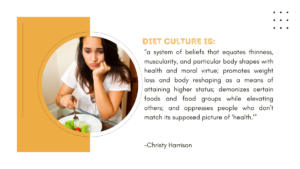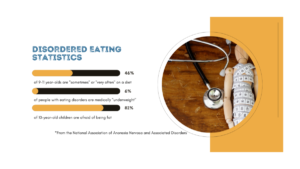The Devil is Tempting Me
“I was good last night and ate a salad so that I could eat this today,” says the woman who sits across from me as she joins a table of diners at a church potluck. “I’m just going to be bad and eat all these carbs,” says another. One by one everyone at the table makes a comment or excuse for the food that they are about to eat. A gorgeous array of foods prepared by church members displaying their best cooking talents and guilt outways the gratitude. As I started to pay attention to the way that church folks talk about food, I noticed a consistent and alarming trend. Clergy and laity alike seemed to struggle with permission to eat, and often used spiritual language to describe the nature of the food they ate. “The devil is tempting me,” “This cake is sinful,” or “I’ll be a glutton and eat dessert” Hearing the way that my church people talked about food with shame, while thanking God for the same food they are demonizing brought me to a tough conclusion: We’ve lost our spiritual understanding of Food.
Diet Culture in the Pews
The small talk about the food I witnessed in our fellowship halls is partly to blame on a diet culture that is deeply embedded in our culture. According to dietitian, Christy Harrison, 
The diet industry is a multi-billion dollar endeavor that depends on convincing people that they are not good enough. Christians are taught that they bear the image of God, and yet we often look at our bodies with disdain. Worse yet is that there is a whole Christian diet industry of books claiming to have the secret to real happiness and holiness through weight loss. The idea that Jesus sells diets is not new. There is a long history of equating thinness with holiness and it is often perpetrated by Christian leaders. Eating bland food has also been tied to godliness. Prominent Presbyterian minister and speaker, Sylvester Graham, started a wave of Christian diets in the 1800s suggesting that boring foods contributed to “health and moral virtue” and that tasty foods led to indigestion and “too much sex between married couples.” [1] Of course this is a silly understanding of the relationship between how food tastes and God.
Two Churches, Same Food Talk
I have served two United Methodist churches in the South Carolina Conference. Both are middle-class to affluent economically, predominantly white, and have mostly university-educated parishioners. The first church I served, St. Paul U.M.C. is a small/medium-sized church in a very rural setting, and the church I serve now is a very large church in a suburban area. Despite the different settings of these two churches, the way that people talked about food around the table was the same: food is morally good or bad and has an impact on my goodness or badness when I eat it.
Diet Culture and God are at Odds
Where diet culture says that you need to change to fit in, God says you already fit perfectly in the Kingdom. While Diet culture says that certain foods are good or bad because of their nature, God Likes Good Food. Food is not morally neutral, but it is not the caloric content that makes food bad. If we want to consider whether food is good or bad we must consider it through a Christian lens. Does this food connect us to each other, or does it separate us from God, God’s creation, or God’s people? God’s grace is symbolized by food in the Bible.
Do No Harm

“Eating Disorder Statistics,” ANAD, accessed April 19, 2022, https://anad.org/eating-disorders-statistics/.
Harm is being done in our churches to people who struggle with food. The reality is that people in my pews have not just food issues, but often have disordered eating. The language we use around food can do harm to people. We need to be careful how we speak about food.
What Can Clergy Do?
As clergy people look to us as examples of behavior. The minister’s plate is fair game for comment at any potluck and it can be tempting to join in the small talk about the moral weight of the food present. People watch us eat and they listen to how we talk about food. We can model a good relationship with food when people see us enjoying food without assessing the worth of food. Instead of talking about calories, talk about how a casserole reminds you of your grandmother. Instead of commenting on the carbs in bread, talk about how communion bread should taste good. Also, clergy can teach good food theology. Congregations need to hear about the Eucharist and the significance of food to Christians. Church should also be a place where people know that they carry a sacred imago dei and are beautiful bodies as they are. We can also offer listening ears when someone wants to talk about food. Lastly, clergy need to address our own issues with food if we hope to be examples to our parishioners.
Recommended Reading
[1] Harrison, Christy. Anti-Diet. New York, NY. Little, Brown, and Company, 2019.
